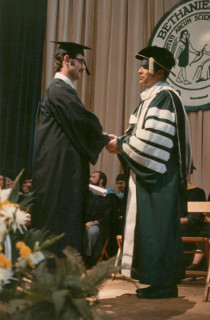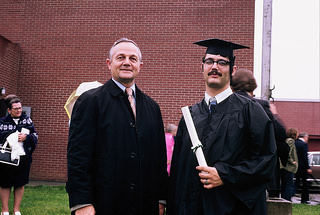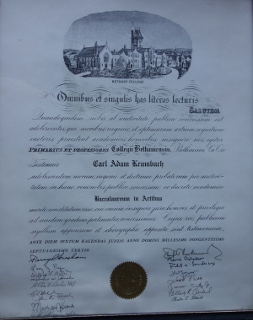Higher education is a tricky subject for me. I work in an industry where a relatively high percentage of my professional peers are autodidacts who do not have formal higher education (myself included). I live in a world where I see a majority of students leaving their higher education institution burdened with substantial student debt and struggling to launch a career, or even get a job at all that will cover basic needs and school debt.
When I look at candidates I find myself largely disregarding higher education and focusing on experience (whether that be tinkering with a Raspberry Pi at a Hackerspace or running a large scale infrastructure) and their level of passion for technology. If the passion and personal excitement are there, our team can bring them up to speed with what they need to know. Plus, technology changes so fast that you need people who can keep up and learn new things quickly, not be tied into old technologies or development paradigms.
Now, there are certainly fundamentals in computer science that are valuable as you progress in your career, but today services like Coursera can get a committed professional up to speed on fundamentals online for free (an aside: The Hardware/Software Interface is an great class, I did it last year and it’s starting again on June 30th).
For me, being an autodidact was largely related to my learning disability, one that I share with my father but which we took two very different paths to overcome.
I graduated high school and swore never to back to school. School was hard for me, I had to study a lot to do well. Today I still employ strategies of note-taking and multimedia to grasp concepts. I also learn through immersion and have a much easier time understanding something if I spend a lot of time drilling down to the bottom and work my way up from specific to general. This takes longer and is really hard to do in a school setting where you’re taught pieces, quizzed on them, and then brought to the next part. Over time I have learned that I often have a much greater understanding than my peers at the end, but along the way it certainly doesn’t feel that way, because I struggle a lot more and ask a lot of strange questions.
Overall, my philosophy has been that if I need additional education, there are plenty of opportunities for me to get it. Putting myself into substantial debt (and the stress of a school setting) in the beginning of adulthood when I don’t actually know what I want to do anyway seemed like it would have been a serious waste.
My father graduated high school, and reading letters he sent to my grandfather I learned that he was a dedicated intellectual who also struggled. But college was the Thing To Do if you wanted to have a professional career in late 1960s-early 1970s. It was a sign of prestige and what was expected from an upper middle class family. It seems to me that it was less about “smart not being enough” and more “if you, have the means, you go to college.”
With this in mind, I spent last week going through some of my father’s papers from Bethany College in West Virginia. My father was very proud of the time he spent at Bethany getting his Journalism degree, participating in school publications, a fraternity and a youth conservative/libertarian party.
I received a Super8 from my Aunt Meg where he is walking around the Bethany campus, showing off his dorm room and what looks like the fraternity house.
Of course graduation itself was a big deal for him as well, so I was happy to find photos from that occasion.
And in the collection of paintings sent to me, his diploma (which I’m shipping off to my youngest sister this week).
A handful of other photos from his graduation here: https://www.flickr.com/photos/pleia2/sets/72157644277944608/
I also learned that in 1978 he established the “James W. Carty Jr. Award” presented to “an outstanding student who excels in work with the campus print media.” Going through papers it looks like he got a notification letter as late as 1999 for a student who has received it.
I’m really proud of my father. He never lost his passion for learning in spite of difficulties, and made the step that I couldn’t do in going to and completing college. I’ve also found myself softening on the idea of higher education. There are so many experiences that he and others had in these higher learning institutions and professional networking opportunities that I have simply missed out on.
He also left an inspiring legacy for me that stressed hard work as the route to success and brought me up in a culture that saw exceptional performance as the norm.





Monday, May 26th, 2014 at 21:22
Interesting. My Dad is dyslexic too, but is also one of the most successful people I’ve ever known. Going by what I’ve seen, it really seems it’s a person’s character that will help them overcome whatever hardships are preventing them from doing what they want to do.
Monday, May 26th, 2014 at 22:06
Support is huge too. My father had the resources he needed when he was a youth. My parents made it a priority to get us in a good school where they caught it early. By 3rd grade I could read and by 8th grade I was exceeding expectations within my age bracket reading-wise.